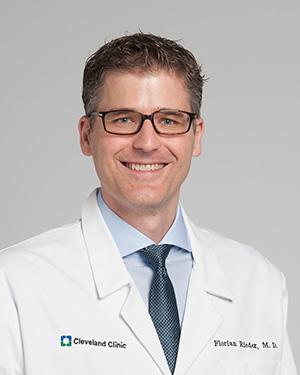Research News
04/15/2019
Helmsley Trust Awards $4.3M for Crohn’s Disease Research
This consortium award will be split among Cleveland Clinic, Mayo Clinic and Robarts Clinical Trials to find viable treatment options for Crohn's disease fibrosis.

Cleveland Clinic has been named the coordinating center for a new $4.3 million grant from the Leona M. and Harry B. Helmsley Charitable Trust to accelerate the development of new anti-fibrotic therapies for patients with Crohn’s disease. This consortium award will be split among Cleveland Clinic, Mayo Clinic and Robarts Clinical Trials.
Stricturing, or narrowing of the gut due to excessive scar tissue, is a complication commonly associated with Crohn’s disease (CD). While advances have been made in fibrotic (scarring) disease of the liver, heart and skin, there are no current anti-fibrotic therapies available for use in CD patients. The overall goal of the Stenosis Therapy and Anti-Fibrotic Research (STAR) Consortium is to develop the tools necessary to conduct clinical trials that can effectively test new drugs that are desperately needed for CD fibrosis. Without quality clinical definitions and outcome measures, researchers cannot determine whether new therapies are viable treatment options.
The award from the Helmsley Charitable Trust will fund three different projects through the STAR Consortium, led by co-principal investigators Florian Rieder, MD, Cleveland Clinic, JG Fletcher, MD, Mayo Clinic, and Brian Feagan, MD, Robarts Clinical Trials. Two projects are designed to develop new clinical trial endpoints and the third project seeks to validate these endpoints. Each participating center will provide expertise in one area of study, including the biology of fibrosis (Cleveland Clinic), radiology (Mayo Clinic) and clinical trial design (Robarts Clinical Trials).
The first project will develop a patient reported outcome tool (PRO) for stricturing CD. PROs are used to collect qualitative measures that can be indicative of a therapy’s success, including measures of disease signs, symptoms and impacts experienced by patients—things not always measurable with numbers or scans. Currently no CD stricture-specific PROs exist. The team will interview a total of 60 patients from Cleveland Clinic and Mayo Clinic to help develop a pilot PRO in accordance with guidance from the U.S. Food & Drug Administration.
The goal of the second project is to develop a prototype for a radiology stricture index, which also does not yet exist for use in the context of CD. A standardized radiology index will be crucial to help researchers understand how treatment affects stricture regression or progression. The tool will be based on magnetic resonance imaging data, particularly magnetic resonance enterography. The researchers will analyze scanned images from more than 100 patients total from Cleveland Clinic and Mayo Clinic in order to develop the index.
Importantly, the third project will validate the aforementioned measures by following a cohort of 150 patients receiving treatment for stricturing CD at Mayo Clinic, Cleveland Clinic, University of Calgary or University of Western Ontario. The patients will be treated with either endoscopic balloon dilation or best medical anti-inflammatory therapy. Researchers will then evaluate treatment outcomes using the STAR Consortium-developed PRO and radiology index to validate the measures’ reliability and response in a real-world setting.
If validated, STAR Consortium researchers will work closely with leading global inflammatory bowel disease societies and drug regulatory agencies to share these tools at no cost with the scientific community for wide-spread use.
Helmsley Charitable Trust aspires to improve lives by supporting domestic and international efforts in health and select place-based initiatives. Some of their major initiatives support medical research focused on Crohn’s disease and Type 1 diabetes, rural healthcare, geographical-based programs that support the welfare and security of people in Israel and New York City and evidence-based interventions for vulnerable children in sub-Saharan Africa. This is first time Cleveland Clinic has been funded by the organization.
“We are exceptionally grateful to the Helmsley Charitable Trust for this opportunity to contribute to the development of novel anti-fibrotic drugs in Crohn’s disease” states Dr. Florian Rieder. “This is uncharted territory and our interdisciplinary investigators in collaboration with IBD societies, regulators, patient representatives and industry will join expertise to tackle this unmet need for our patients.”
The STAR Consortium’s research will lay the foundation for future clinical studies into stricturing CD.
Featured Experts
News Category
Related News
Research areas
Want To Support Ground-Breaking Research at Cleveland Clinic?
Discover how you can help Cleveland Clinic save lives and continue to lead the transformation of healthcare.
Give to Cleveland Clinic